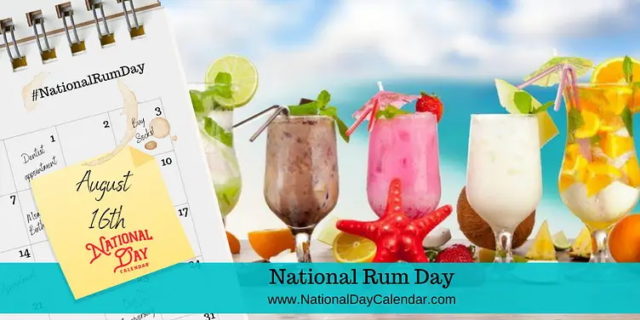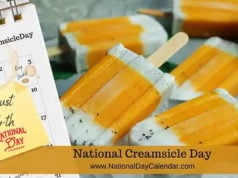
Join National Rum Day on August 16th as blended beverages and cocktails create a delicious celebration. Rum is a distilled clear alcoholic beverage which is a byproduct of sugar production. It can also be made directly from sugar cane juice. After the fermentation and distillation process, most rum ages in wooden oak barrels.
- In 1764, the British Crown placed a tax on sugar, molasses and rum on the American colonies. This tax was called The Sugar Act of 1764. It was instrumental in the unrest that finally became the American Revolution.
- Rum is the third most popular spirit in the United States. Only vodka and all the whiskeys combined beat it for first and second-rankings.
- Rum was manufactured, distilled, and made long before any other spirit. It’s history is a vast one filled with stories, and fables. It was the first branded spirit made.
- Rations of rum were given to sailors in the British Army to be mixed with lime juice because it fought off the scurvy.
- Even in the modern Royal Navy, British sailors received an allotment of rum until 1970.
- In Australia, the rum hospital can recognize rum as it as its chief contributor of revenues that were generated via the rum exports they were known for.
- Triangular trade was introduced as slaves were traded for rum, sugars, and other items that were all carrying missionaries- this was known as ‘rum and bible.’
- The infamous Admiral Nelson who died in the Battle of Tralfager, had his body preserved in a cask of rum before it was laid to rest.
- One of the famous drinks known as rum sour was created in Barbados and served in a conch shell.
- More than 80 percent of the world’s rum sources originate in Puerto Rico. This is because of the sugar cane that is used in the product that comes from the area as well.
- Extended barrel aging of rum can produce a darker color due to the way it is aged in the wooden casks and barrels.
- Twelve million gallons of rum were consumed annually by the early American colonists.
- Rum’s association with piracy began with British privateers trading on the valuable commodity. As some of the privateers became pirates and buccaneers, their fondness for rum remained, the association between the two only being strengthened by literary works such as Robert Louis Stevenson’s Treasure Island.
- The oldest known rum is The Harewood Rum 1780, believed to have been distilled in 1780 in Barbados. In 2011, fifty-nine bottles of the previously-forgotten rum were discovered in the basement of Harewood House, Leeds, UK.
- The origin of the word “rum” is generally unclear. In an 1824 essay about the word’s origin, Samuel Morewood, a British etymologist, suggested it might be from the British slang term for “the best”, as in “having a rum time.” He wrote: As spirits, extracted from molasses, could not well be ranked under the name whiskey, brandy, or arrack, it would be called rum, to denote its excellence or superior quality.
- George Washington insisted on a barrel of Barbados rum being available at his 1789 inauguration
- India is the world’s largest market for rum.
- As if you needed another reason to drink rum, there are some suggestions that this liquor can actually help prevent hair loss. Many people today believe in this home remedy to keep their hair in place. In fact, in the 1800s, rum was used by many as a type of shampoo to clean the hair and most people believed that it actually helped make their hair thicker.
- President George Washington was quite the mixologist back in his day. In fact, he was well known for his famous Mount Vernon Eggnog.
Sources:












